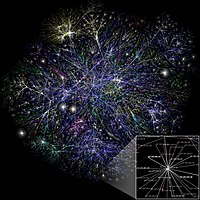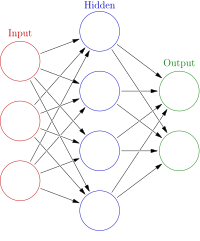
Detecting Chemotherapeutic Skin Adverse Reactions in Social Health Networks Using Deep Learning
Sign Up to like & getrecommendations! Published in 2018 at "JAMA Oncology"
DOI: 10.1001/jamaoncol.2017.5688
Abstract: This study reports proof-of-principle early detection of chemotherapeutic-associated skin adverse drug reactions from social health networks using a deep learning–based signal generation pipeline to capture how patients describe cutaneous eruptions. read more here.
Keywords: reactions social; networks using; using deep; social health ... See more keywords

Practical characterization of large networks using neighborhood information
Sign Up to like & getrecommendations! Published in 2018 at "Knowledge and Information Systems"
DOI: 10.1007/s10115-018-1167-0
Abstract: Characterizing large complex networks such as online social networks through node querying is a challenging task. Network service providers often impose severe constraints on the query rate, hence limiting the sample size to a small… read more here.
Keywords: large networks; information; neighborhood information; characterization large ... See more keywords

Evolving neural networks using bird swarm algorithm for data classification and regression applications
Sign Up to like & getrecommendations! Published in 2019 at "Cluster Computing"
DOI: 10.1007/s10586-019-02913-5
Abstract: This work proposes a new evolutionary multilayer perceptron neural networks using the recently proposed Bird Swarm Algorithm. The problem of finding the optimal connection weights and neuron biases is first formulated as a minimization problem… read more here.
Keywords: networks using; bird swarm; swarm algorithm; neural networks ... See more keywords

Model-free inference of diffusion networks using RKHS embeddings
Sign Up to like & getrecommendations! Published in 2018 at "Data Mining and Knowledge Discovery"
DOI: 10.1007/s10618-018-00611-1
Abstract: We revisit in this paper the problem of inferring a diffusion network from information cascades. In our study, we make no assumptions on the underlying diffusion model, in this way obtaining a generic method with… read more here.
Keywords: networks using; diffusion; inference diffusion; free inference ... See more keywords

Capacity Improvement in 5G Networks Using Femtocell
Sign Up to like & getrecommendations! Published in 2019 at "Wireless Personal Communications"
DOI: 10.1007/s11277-019-06134-2
Abstract: Allocation of resources between femtocell and macrocell is essential to counter the effects of interference in the dense femtocell. The significant increase in the number of internet users and the demand for higher data capacity… read more here.
Keywords: improvement networks; using femtocell; networks using; capacity improvement ... See more keywords

Optimal Harvesting and Sensing Duration for Cognitive Radio Networks Using Non Orthogonal Multiple Access
Sign Up to like & getrecommendations! Published in 2021 at "Wireless Personal Communications"
DOI: 10.1007/s11277-021-08987-y
Abstract: In this paper, we suggest to optimize both power allocation coefficients, harvesting and sensing durations for cognitive radio networks using non orthogonal multiple access (CR-NOMA). In the first slot, secondary transmitter harvests energy from radio… read more here.
Keywords: networks using; using non; harvesting sensing; radio ... See more keywords

Defining phylogenetic networks using ancestral profiles.
Sign Up to like & getrecommendations! Published in 2021 at "Mathematical biosciences"
DOI: 10.1016/j.mbs.2021.108537
Abstract: Rooted phylogenetic networks provide a more complete representation of the ancestral relationship between species than phylogenetic trees when reticulate evolutionary processes are at play. One way to reconstruct a phylogenetic network is to consider its… read more here.
Keywords: networks using; defining phylogenetic; network; ancestral profiles ... See more keywords

Hopfield neural networks using Klein four-group
Sign Up to like & getrecommendations! Published in 2020 at "Neurocomputing"
DOI: 10.1016/j.neucom.2019.12.127
Abstract: Abstract Complex-valued Hopfield neural networks have been extended to several high-dimensional Hopfield neural networks (HDHNNs) using hypercomplex numbers. However, the extensions by hypercomplex numbers are limited. For example, the dimensions of Clifford and Cayley-Dickson algebras… read more here.
Keywords: networks using; neural networks; four group; klein four ... See more keywords

Reducing the complexity of financial networks using network embeddings
Sign Up to like & getrecommendations! Published in 2020 at "Scientific Reports"
DOI: 10.1038/s41598-020-74010-2
Abstract: Accounting scandals like Enron (2001) and Petrobas (2014) remind us that untrustworthy financial information has an adverse effect on the stability of the economy and can ultimately be a source of systemic risk. This financial… read more here.
Keywords: networks using; complexity financial; network; reducing complexity ... See more keywords

Competitive networks using chaotic circuits with hierarchical structure.
Sign Up to like & getrecommendations! Published in 2019 at "Chaos"
DOI: 10.1063/1.5093331
Abstract: Coupled oscillatory systems are good models that are able to describe a variety of higher dimensional nonlinear phenomena. Coupled chaotic circuits produce many kinds of interesting synchronization phenomena. In recent years, research studies on complex… read more here.
Keywords: networks using; hierarchical structure; competitive networks; circuits hierarchical ... See more keywords

Inferring directed networks using a rank-based connectivity measure.
Sign Up to like & getrecommendations! Published in 2019 at "Physical review. E"
DOI: 10.1103/physreve.99.012319
Abstract: Inferring the topology of a network using the knowledge of the signals of each of the interacting units is key to understanding real-world systems. One way to address this problem is using data-driven methods like… read more here.
Keywords: rank based; directed networks; inferring directed; networks using ... See more keywords